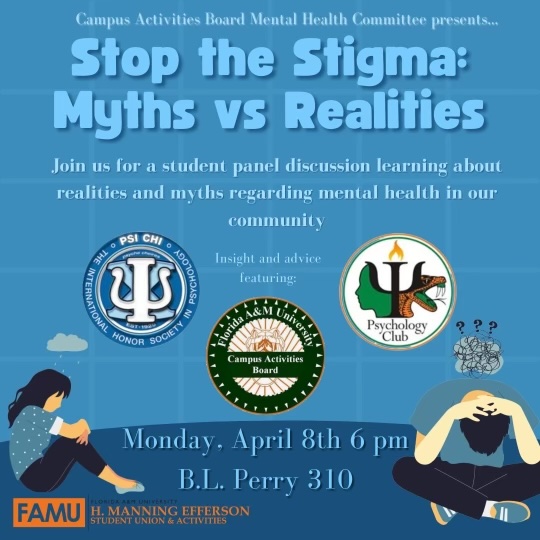
Photo Courtesy: FAMU Campus Activities Board Instagram
One of the remaining taboos in many communities of color is the stigma surrounding mental illness.
Whether it’s anxiety, depression, or bipolar disorder, there is an endless belief in these communities that there is no such thing as mental illness or a person who struggles with their mental health.
On Monday evening, the Florida A&M University’s Campus Activities Board hosted a student panel discussion sharing their insights and experiences and gave advice to discover the best strategies for coping with mental health in college.
The panel began with an introduction of the panelists all from different walks of life but sharing one common goal; to educate and reassure.
With the session starting at 6 p.m., Aniyah Sparks, moderator for the panel allowed each panelist to answer questions discussing several issues and problems that often create mental health issues in the Black community.
From socioeconomic status to traumatic childhood experiences, additional layers are added in the development of mental health issues.
According to the Associated Press, about 53% of Black youth experience moderate to severe symptoms of depression, and about 20% said they were exposed to racial trauma often or very often in their life.
Jordan McCrary, a third-year psychology student and representative of the University’s Cab Mental Health and Wellness committee discussed why mental health is so important in the Black community.
“Unfortunately, mental health within the black community is often stigmatized, which makes people not want to seek the treatment that they need,” McCrary said. “I believe that keeping mental health apart of conversation allows people to understand what they’re feeling and why they may feel that way.”
Patick Mosley, a fourth-year psychology student from West Palm Beach and panelist shared his experience dealing with his mental as an African American male in society.
“Growing up, I didn’t have the support of knowledge about mental health,” Mosley said. “So often in our community, we’re taught as males to be strong and not show any emotion. Now as an adult, I am more knowledgeable about mental health and the resources offered to help.
Mosley also discussed the impact your environment can have on your mental health.
“I have many people who have a negative impact on me, but I also have a strong positive support system as well,” Mosley said. “I think finding that balance keeps me out of my head and focused.”
The mental help committee plans to host a second mental health session in the future. For more information on events hosted by the University’s cabinet, make sure to follow them on Instagram @famucab1887.